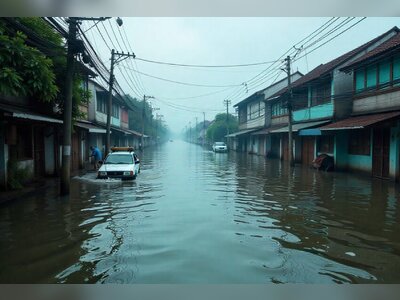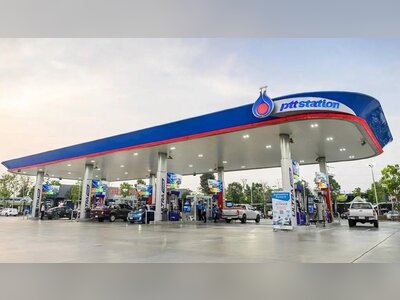Egco's Efforts in Carbon Neutrality and Renewable Energy Transition
Electricity Generating Plc aims for carbon neutrality by 2040 while boosting renewable energy contributions.
Electricity Generating Plc (Egco), the power generation arm of the Electricity Generating Authority of Thailand, is implementing a multifaceted strategy to align its operations with global climate goals while also pursuing revenue growth.
As part of its commitment to combat climate change, Egco has set ambitious targets to reduce carbon dioxide emissions and increase the share of renewable energy in its generation capacity.
Egco aims to cut its carbon dioxide emissions intensity by 10% in the short term and increase the proportion of renewable energy in its total generating capacity to 30% by 2030. The company is targeting carbon neutrality by 2040, followed by a goal of achieving net-zero emissions by 2050.
Jiraporn Sirikum, president of Egco, emphasized the importance of transitioning to cleaner energy sources and improving energy management.
Among the strategic measures is the use of alternative fuels in power generation, particularly the integration of hydrogen.
In the United States, at the Linden Cogen Unit 6 plant, Egco has begun blending hydrogen with natural gas, with hydrogen accounting for 40% of the fuel mix.
This approach is expected to enhance the overall efficiency of the power plant and reduce carbon dioxide emissions by approximately 10%.
In addition to its hydrogen initiatives, Egco is involved in logistics projects utilizing hydrogen-powered trucks.
In partnership with Thailand Post, Bangkok Industrial Gas Co, and the Digital Government Development Agency, the company is launching a project in Rayong, where trucks fueled by grey hydrogen will deliver parcels, marking a significant step toward cleaner logistics in Thailand.
Egco is employing both natural and technologically advanced methods to tackle emissions.
The company’s natural approach includes afforestation efforts through the Thai Rak Pa Foundation, which aims to conserve 100,000 rai of forested areas and promote biodiversity.
This initiative involves collaboration with government agencies, local communities, and youth networks, focusing on environmental education and sustainable resource management.
On the technological front, Egco is assessing the feasibility of carbon capture, utilization, and storage (CCUS) technology for future installation at several power plants, including BLCP in Rayong, Khanom in Nakhon Si Thammarat, and Paju in South Korea.
Simultaneously, Egco is managing its investment portfolio to optimize revenue while advancing its renewable energy initiatives.
Recently, the company divested its 49% stake in a gas-fired power plant operated by Risec Holdings, completing the sale to Shell Energy North America.
This decision is part of Egco's broader strategy of asset recycling, aimed at pursuing projects that promise long-term growth.
The divestment is expected to facilitate new investment opportunities in the U.S., while existing investments in energy assets are projected to generate higher revenue.
Among these investments is a 50% stake in the Compass Portfolio, operating three power plants employing combined cycle gas turbine technology.
Additional revenue is anticipated from renewable energy projects, including sales and operations initiated by Apex Clean Energy Holdings, which manages projects under a hybrid business model.
In Taiwan, Egco's share in Yunlin offshore wind farms is expected to contribute to financial performance this year, further supporting efforts to enhance renewable resources.
The company also aims to secure new power purchase agreements for its Quezon power plant in the Philippines.
Overall, Egco's initiatives not only reinforce its financial status but also contribute significantly to the attainment of its carbon neutrality objectives.
As part of its commitment to combat climate change, Egco has set ambitious targets to reduce carbon dioxide emissions and increase the share of renewable energy in its generation capacity.
Egco aims to cut its carbon dioxide emissions intensity by 10% in the short term and increase the proportion of renewable energy in its total generating capacity to 30% by 2030. The company is targeting carbon neutrality by 2040, followed by a goal of achieving net-zero emissions by 2050.
Jiraporn Sirikum, president of Egco, emphasized the importance of transitioning to cleaner energy sources and improving energy management.
Among the strategic measures is the use of alternative fuels in power generation, particularly the integration of hydrogen.
In the United States, at the Linden Cogen Unit 6 plant, Egco has begun blending hydrogen with natural gas, with hydrogen accounting for 40% of the fuel mix.
This approach is expected to enhance the overall efficiency of the power plant and reduce carbon dioxide emissions by approximately 10%.
In addition to its hydrogen initiatives, Egco is involved in logistics projects utilizing hydrogen-powered trucks.
In partnership with Thailand Post, Bangkok Industrial Gas Co, and the Digital Government Development Agency, the company is launching a project in Rayong, where trucks fueled by grey hydrogen will deliver parcels, marking a significant step toward cleaner logistics in Thailand.
Egco is employing both natural and technologically advanced methods to tackle emissions.
The company’s natural approach includes afforestation efforts through the Thai Rak Pa Foundation, which aims to conserve 100,000 rai of forested areas and promote biodiversity.
This initiative involves collaboration with government agencies, local communities, and youth networks, focusing on environmental education and sustainable resource management.
On the technological front, Egco is assessing the feasibility of carbon capture, utilization, and storage (CCUS) technology for future installation at several power plants, including BLCP in Rayong, Khanom in Nakhon Si Thammarat, and Paju in South Korea.
Simultaneously, Egco is managing its investment portfolio to optimize revenue while advancing its renewable energy initiatives.
Recently, the company divested its 49% stake in a gas-fired power plant operated by Risec Holdings, completing the sale to Shell Energy North America.
This decision is part of Egco's broader strategy of asset recycling, aimed at pursuing projects that promise long-term growth.
The divestment is expected to facilitate new investment opportunities in the U.S., while existing investments in energy assets are projected to generate higher revenue.
Among these investments is a 50% stake in the Compass Portfolio, operating three power plants employing combined cycle gas turbine technology.
Additional revenue is anticipated from renewable energy projects, including sales and operations initiated by Apex Clean Energy Holdings, which manages projects under a hybrid business model.
In Taiwan, Egco's share in Yunlin offshore wind farms is expected to contribute to financial performance this year, further supporting efforts to enhance renewable resources.
The company also aims to secure new power purchase agreements for its Quezon power plant in the Philippines.
Overall, Egco's initiatives not only reinforce its financial status but also contribute significantly to the attainment of its carbon neutrality objectives.











